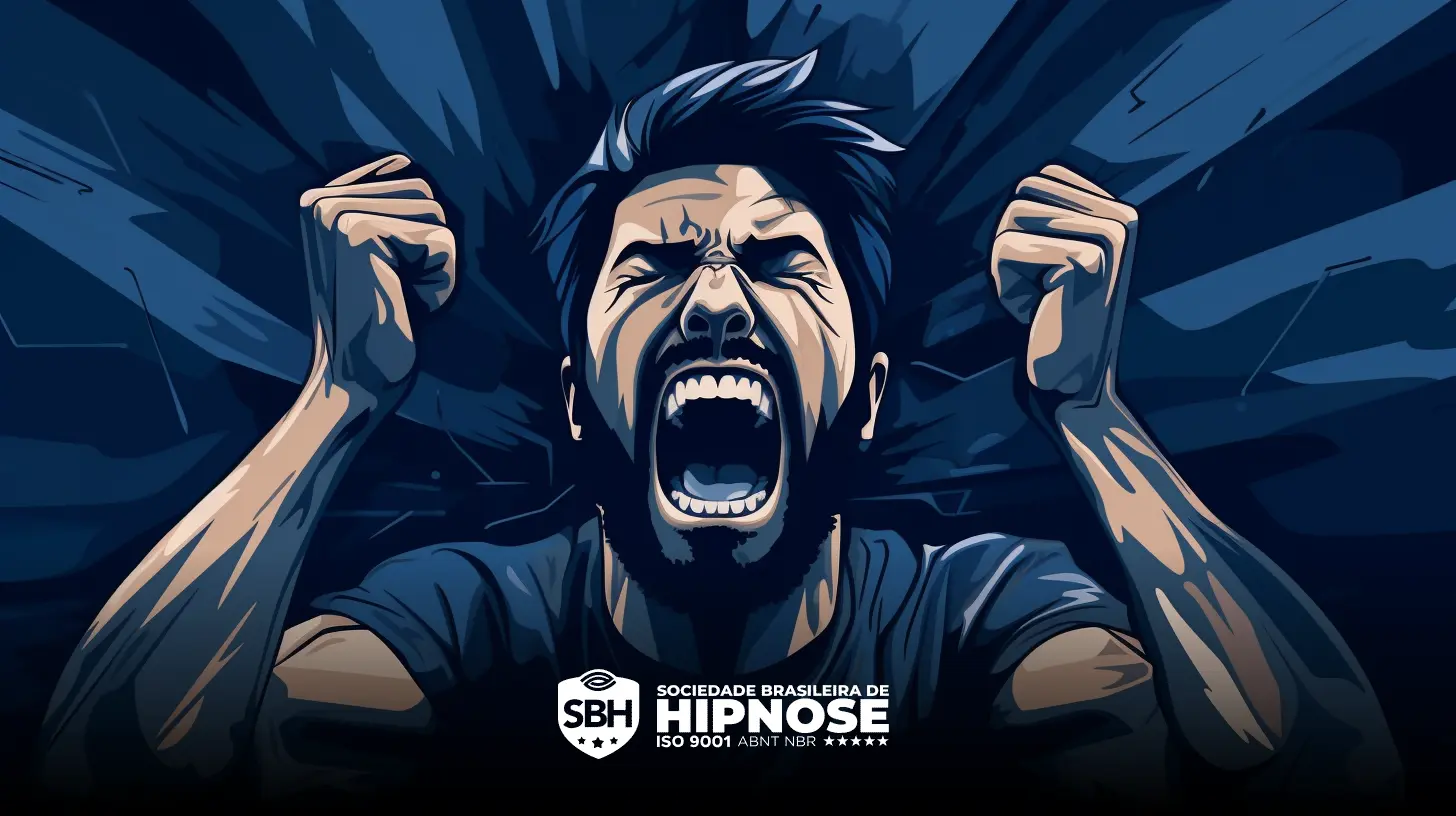Have you ever felt a wave of frustration hitting you like a high tide? We are sure you have, after all, all of us, at some point, have faced this uncomfortable feeling. But have you ever stopped to reflect on what frustration is, its causes, and how we can deal with it effectively and healthily? Yes, it is challenging, but not impossible.
In our guide, you will not only understand the origin of frustration but also how it is influenced by other emotional factors such as stress and anxiety. We will address the effects this emotion has on our emotional health and the most common reactions to it. But don’t worry, we won’t just talk about the challenges, but also the solutions.
At the Brazilian Society of Hypnosis (SBH), we are dedicated to promoting emotional health in an ethical and scientific way. And that’s why we will present how clinical hypnosis can be a valuable resource for dealing with frustration. We believe that what stress and anxiety can worsen, scientific hypnosis can help.
And it doesn’t stop there! We will also talk about resilience, mindfulness techniques, cognitive-behavioral therapy, and other strategies to manage and overcome frustration. Our goal is to make frustration a journey of growth, and we believe that with the right tools and information, you can too.
Understanding Frustration: What It Is and What Are Its Causes
Frustration is a deep emotion that we all experience at some point in our lives. It occurs when there is a contrast between expectations and reality, when we desire something that is out of our reach, or when our efforts to achieve a goal do not bring the expected results.
A practical example would be students who expect high grades but fail to achieve them. Frustration can become a dominant emotion that can cause anxiety and stress.
The causes of frustration can be categorized into two basic types: internal and external. Internal frustrations are those that arise from personal feelings of inadequacy, low self-esteem, or inability. In contrast, external frustrations are triggered by events or circumstances beyond our control, such as job loss, financial problems, or relationship conflicts.
In summary, frustration is a reaction to internal or external obstacles that impede progress toward a desired goal. Understanding these causes is a crucial step for an effective frustration relief strategy. Knowing more about these causes, you as a clinical hypnosis professional, can offer better support to your patients in dealing with this challenging emotion.
How Are Stress and Anxiety Related to Frustration?
We humans are programmed to avoid discomfort. Stress and anxiety, which are natural responses to perceived threat or discomfort, can cause the sensation of frustration. This emotion usually arises when we encounter obstacles that hinder our progress or the fulfillment of our goals and desires.
Often, stress and anxiety cause an increase in the level of frustration, as both can lead to a distorted perception of reality and a feeling of inability to deal with challenges. This relationship can create a vicious cycle: the more stressed and anxious we feel, the more frustrated we become, which, in turn, leads to increased stress and anxiety.
In terms of physiological reactions, stress and anxiety activate our sympathetic nervous system, which prepares the body for “fight or flight”. When our fight – in the figurative sense – is unsuccessful, that is, when we encounter an obstacle that seems insurmountable, this can generate frustration.
Understanding this connection between stress, anxiety, and frustration is important, as it helps us develop effective strategies to deal with these feelings and emotions. Being able to handle frustration is essential for our mental health and emotional balance.
The Effects of Frustration on Emotional Health

In simple terms, frustration can be understood as a feeling of disappointment or discontent that arises when expectations and desires are not met. And the effects of this feeling on emotional health can be quite severe.
In isolation, frustration is not necessarily harmful. It is part of life and can even act as an important motivation for overcoming obstacles and personal growth. However, a constant experience of frustration can be extremely emotionally draining, leading a person to develop anxiety and chronic stress.
Every accumulated feeling, without proper processing and resolution, has the potential to generate serious emotional problems. Frustration, when not addressed, can lead to feelings of anger, hopelessness, and low self-esteem. This can generate a constant feeling of dissatisfaction with one’s own life, harming an individual’s emotional health.
Therefore, it is highly beneficial for a person to learn healthy coping strategies, such as clinical hypnosis, to deal with frustration. These techniques can transform the way a person perceives and reacts to frustrations, allowing for a more balanced and less stressful response in the face of these challenges.
Common Ways of Reacting to Frustration
Reacting to frustration is a completely normal human response. We all experience it in one way or another. However, how we deal with this frustration makes all the difference.
Outbursts of anger
One of the common reactions to frustration is the emotional outburst. When faced with a situation that does not meet our expectations, some of us may react with anger or deep irritation. This can manifest verbally or even physically.
Avoiding the Situation
Others may choose to avoid the situation that causes frustration, as the prospect of facing discomfort seems too unpleasant. This can lead to postponing responsibilities and procrastination.
Passive Acceptance
For some, the reaction to frustration may not be an active reaction, but rather a passive acceptance of the triggering event. This can lead to feelings of helplessness, lack of assertiveness, and eventually, declining self-esteem.
In summary, anger, discontent, and apathy are just some of the common reactions to frustration. However, learning to manage these responses is crucial to maintaining emotional health and avoiding the buildup of stress and anxiety.
Clinical Hypnosis in Assisting Against Frustration
We, at the Brazilian Society of Hypnosis (SBH), see clinical hypnosis as a vital intervention tool when dealing with frustration.
Frustration is a powerful emotional trigger that can induce harmful thoughts and behaviors. However, clinical hypnosis can play a significant role in restructuring these automatic thoughts and behaviors.
The role of clinical hypnosis
Clinical hypnosis creates a state of calm and focus where positive suggestions and coping skills are more easily absorbed by the mind. This helps people better manage their reactions to frustration.
Reinforcing frustration tolerance
Through hypnosis techniques, we can reinforce frustration tolerance. This involves introducing therapeutic suggestions that promote positive thoughts and better emotional regulation.
Our goal is to assist in building a set of skills that will help you handle frustrating situations more healthily and productively. Clinical hypnosis can also contribute to reducing the negative effects of stress and anxiety, which can exacerbate frustration.
Remember, hypnosis is not a miracle solution. But, if used correctly, it can be a powerful ally in promoting mental and emotional health.
Frustration and Resilience: How to Develop Tolerance

Dealing with frustration can be a challenge. However, it is essential to remember that frustration is a natural part of life. We all go through moments of dissatisfaction and setbacks. The question is, how can we improve our ability to deal with these moments? One way is to develop resilience.
Resilience is the ability to adapt and respond positively to difficult situations. Resilient people tend to see frustrations as learning opportunities, rather than being overwhelmed by negative feelings. Developing resilience is an ongoing process that requires self-care, self-awareness, and focus on what really matters to you.
Let’s then understand how we can develop this skill.
1) Practice self-care: taking care of yourself is essential to maintaining resilience and dealing with frustration. This includes getting a good night’s sleep, eating a balanced diet, exercising regularly, and setting aside time to relax and have fun.
2) Focus on growth: facing challenges and setbacks as opportunities for growth and learning is a key aspect of resilience. Instead of focusing on the problem, think about what you can learn from the situation.
3) Cultivate positive relationships: establishing and maintaining positive relationships is crucial for resilience. The people who support us can help us overcome moments of frustration.
4) Accept that changes are part of life: an essential characteristic of a resilient person is the ability to accept that changes are inevitable. This can give you the flexibility needed to adapt in times of stress and frustration.
In summary, dealing with frustration is challenging, but developing resilience can be an ally to overcome these moments.
Mindfulness Techniques in Reducing Frustration
Mindfulness techniques are powerful allies in reducing frustration. Let me show you how they work.
Mindfulness invites you to experience the present moment consciously and without judgment. In practice, this approach helps calm the whirlwind of thoughts and emotions that frustration can trigger.
Imagine that frustration is a storm in the sea of your mind. Mindfulness is like settling in a safe harbor, observing the storm without being carried away by the current.
By practicing mindfulness, you will be creating a welcoming space for your emotions. Thus, instead of reacting instantly to frustration, you will learn to respond more wisely and balanced.
Some simple practices, such as conscious breathing or mindfulness meditation, can be very helpful in this regard. Remember, the essential is to cultivate an attitude of curiosity and kindness towards your own experience, no matter how uncomfortable it may be.
This change of perspective can be incredibly therapeutic. It will facilitate your relationship with frustration, transforming this feeling into a teacher, rather than an enemy.
Analyzing the Situation: Ways to Deal with Frustrations
Dealing with frustration situations requires careful analysis of the circumstances. First, it is essential to identify the origin of the frustration. It can be an unrealized expectation, delay in plans, a denial, or any other situation that prevents the achievement of a goal. By identifying the cause, it is easier to develop appropriate strategies to resolve the situation.
Second, a realistic perception of the situation is necessary. Often, frustrations are amplified by a distorted view of circumstances, leading to exaggerated feelings of despair and helplessness. The practice of clinical hypnosis can help in this perception change. Focusing on the idea that every obstacle is an opportunity for growth and not a reason for defeat.
Third, effective time management and planning can prevent frustration. Setting realistic goals and adequately scheduling time can help avoid many frustrating situations.
Finally, resilience is a vital tool in managing frustration. We cannot control all the elements of our lives. However, we can control how we react to them. Developing the ability to come back strong after a setback is key to effectively dealing with frustration.
It is important to remember that each person is unique and ways of dealing with frustration may vary. If you are going through difficult times, it is advisable to seek professional help.
Cognitive-Behavioral Therapy and Overcoming Frustration

Cognitive-Behavioral Therapy (CBT) is one of the most effective ways to deal with frustration. This therapeutic approach allows identifying and correcting automatic negative thoughts that can intensify feelings of frustration.
With CBT, one learns to assess the legitimacy and usefulness of these thoughts. By questioning them, it is possible to reduce the intensity of feelings of irritation and sadness, which commonly accompany frustration.
This therapy also provides useful strategies to face situations that tend to generate frustration. For example, the “stop – start” technique, which consists of stopping the frustrating thought and replacing it with a more positive or realistic thought.
But it is important to emphasize, no technique or therapy makes frustration disappear completely and instantly. However, the goal is to learn to live with it in a healthier way, knowing that it is a natural feeling and can be managed.
With this, it is expected that the intensity and frequency of frustration decrease over time, providing more quality of life and well-being for the individual.
Conclusion: Turning Frustration into a Journey of Growth
Finding ways to deal with frustration is a continuous path of self-discovery and a crucial step in the journey of personal and professional growth. In this sense, hypnotherapy presents itself as a valid and effective tool to deal with these complex feelings.
It is worth remembering that this journey can sometimes be marked by difficult moments and it is exactly when and where we develop our strength and resilience. Transforming frustration into an opportunity for growth involves changing the way we understand this feeling, leading to greater understanding and acceptance of ourselves and the environment we find ourselves in.
Through practices such as clinical hypnosis, we can gain greater self-awareness and improve our responses to irritating, frustrating, or stressful situations. Thus, we become capable of transforming feelings of frustration into a source of motivation and growth.
In the end, the important thing is to turn adversities into lessons and keep evolving. Understanding frustration and finding effective ways to deal with it represents a significant step in this direction. May frustration be a starting point, not a final destination in our journey of personal and professional growth.
In summary: Facing Frustration as a Path to Growth
Reviewing the main points addressed throughout this article, it becomes evident the importance of identifying frustration, understanding its causes, and seeking overcoming methods. This task, although challenging, is fundamental to improving emotional health and quality of life.
Although frustration is a common feeling inherent to our existence, it is essential to find ways to deal with it, in order to avoid the accumulation of stress and anxiety. In this sense, clinical hypnosis stands out as a powerful tool in managing these complex feelings.
Other techniques, such as cognitive-behavioral therapy and mindfulness, have also proven effective in overcoming frustration. Both focus on promoting greater awareness of reality, allowing for a more balanced and less stressful response to challenges.
Finally, it is essential to highlight the role of resilience in this process. Knowing how to deal with setbacks is crucial for maintaining emotional balance. Each obstacle overcome thus becomes an opportunity for personal and professional growth and improvement.
Are you interested in learning scientific hypnosis to apply professionally? To enhance your results in your current profession or even have a new profession? Learn about the evidence-based hypnosis training and postgraduate courses from the Brazilian Society of Hypnosis through the link: https://www.hipnose.com.br/cursos/ .
Be an instrument of change! Share this knowledge and make a difference in someone’s life!
Frequently Asked Questions
What is the role of clinical hypnosis in relieving frustration?
Clinical hypnosis is an effective therapeutic method for overcoming frustration. It helps relax the mind, relieve stress and anxiety, and restructure negative thoughts that often cause frustration. This allows the person to find a more effective way to deal with situations that previously caused them frustration.
How can I develop resilience in the face of frustration?
Developing resilience requires practice and patience. It starts with accepting frustration as a natural part of life and realizing that it doesn’t have to dominate us. Learning to adapt, to be positive in the face of adversity, and to stay focused, even when things don’t go as planned, are key components in building resilience.
What is cognitive-behavioral therapy in the context of overcoming frustration?
Cognitive-behavioral therapy (CBT) is an effective form of treatment for frustration. It helps identify and change negative thought patterns and self-destructive behaviors that can lead to frustration. CBT teaches strategies to deal with frustrating situations, promoting emotional well-being.
How can I apply mindfulness techniques to reduce frustration?
Mindfulness techniques involve focusing on the present experience and accepting it without judgment. This can include breathing exercises, meditation, or simply being aware of your thoughts and feelings without trying to change them. By practicing mindfulness, it is possible to learn to respond to frustration in a more balanced and less reactive way.
Is it possible to turn frustration into a growth experience?
Yes, it is possible. Frustration can be seen as an opportunity for learning and growth. Understanding the cause of frustration and seeking productive ways to deal with it can lead to self-improvement and the development of new skills or attitudes.




